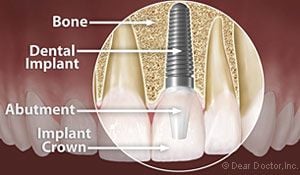The dental implant is today's state-of-the-art tooth replacement method. It consists of a very small titanium post (the actual implant), which is attached to a lifelike dental crown. The crown is the only part of this tooth-replacement system that is visible in your mouth. The implant itself rests beneath
Read moreContact Us
Implant Dentistry
Of all the ways modern dentistry has to replace missing teeth, dental implants are by far the best. There is no tooth-replacement option that will give you a longer-lasting result. Implants also help preserve tooth-supporting bone that naturally deteriorates when a tooth is lost. Loss of bone is one of the major hidden consequences of losing teeth.
A dental implant most often takes the form of a small, screw-shaped titanium post that replaces the root-part of a missing tooth. The surgical procedure used to place an implant is actually quite minor and routine, requiring only local anesthesia in most cases. After a healing period, the implant is topped with a lifelike crown custom-made to match your existing natural teeth. Implants have a documented success rate of over 95%, which is significantly higher than any other tooth-replacement option.
How Implants Work
During a minor surgical procedure, your dental implant is inserted directly into the jawbone in the space vacated by the missing tooth. It will then be left to heal for a period of months before the final crown is attached. During this healing period, the implant actually fuses to the bone surrounding it.
Tooth Replacement Options Using Dental Implants
Implants can replace missing teeth in a variety of ways. They can be used to:
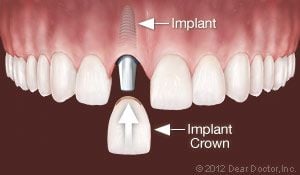 Replace One Tooth — When you have one tooth missing, a single implant is inserted into the bone to replace the root part of that tooth; a crown then goes on top to simulate an actual tooth. This treatment choice has the highest success rate, making it the best long-term investment for replacing a single missing tooth. Even if the initial cost is slightly higher than other options, it is the most cost-effective solution over time. An implant will never decay or need root canal treatment, and feels just like the tooth that was there.
Replace One Tooth — When you have one tooth missing, a single implant is inserted into the bone to replace the root part of that tooth; a crown then goes on top to simulate an actual tooth. This treatment choice has the highest success rate, making it the best long-term investment for replacing a single missing tooth. Even if the initial cost is slightly higher than other options, it is the most cost-effective solution over time. An implant will never decay or need root canal treatment, and feels just like the tooth that was there.
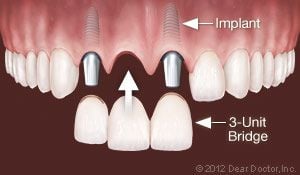 Replace Multiple Teeth — When you have more than one tooth missing, implants provide an ideal replacement mechanism. You don't even need one implant for every missing tooth. Instead, implant teeth can act as supports for fixed bridgework. For example, if you are missing three teeth in a row, we can place two implants, one on either side of the gap, and a crown in between that has no implant underneath. That way, you won't need to use any of your remaining natural teeth as bridge supports, which could weaken them and make them more susceptible to decay.
Replace Multiple Teeth — When you have more than one tooth missing, implants provide an ideal replacement mechanism. You don't even need one implant for every missing tooth. Instead, implant teeth can act as supports for fixed bridgework. For example, if you are missing three teeth in a row, we can place two implants, one on either side of the gap, and a crown in between that has no implant underneath. That way, you won't need to use any of your remaining natural teeth as bridge supports, which could weaken them and make them more susceptible to decay.
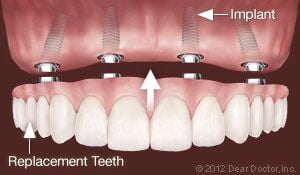 Replace All Teeth Permanently — Implants can support an entire arch of upper or lower replacement teeth that are fixed into the mouth and are never removed. Sometimes the new teeth can be supported by as few as 4 implants. It's comparable to the structure of a table, which only needs 4 legs to hold it up. In cases where jawbone density and volume have deteriorated, 5 or 6 implants might be needed to support a row of 10 to 12 teeth. Dental implant replacement teeth protect your jawbone, won't slip, and should last a lifetime.
Replace All Teeth Permanently — Implants can support an entire arch of upper or lower replacement teeth that are fixed into the mouth and are never removed. Sometimes the new teeth can be supported by as few as 4 implants. It's comparable to the structure of a table, which only needs 4 legs to hold it up. In cases where jawbone density and volume have deteriorated, 5 or 6 implants might be needed to support a row of 10 to 12 teeth. Dental implant replacement teeth protect your jawbone, won't slip, and should last a lifetime.
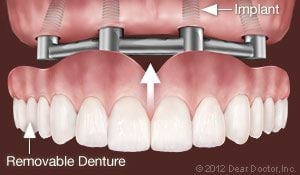 Support Removable Dentures — Implants can even make removable dentures more comfortable, effective and healthier to wear. Traditional dentures rest on the gums and put pressure on the underlying bone. This accelerates bone loss so that the jaw shrinks and the dentures slip, particularly on the bottom. But today dentists can attach a removable denture onto implants, transferring that pressure into the bone structure rather than the bone surface. This prevents the dentures from slipping while you eat and speak, and preserves the bone directly beneath them.
Support Removable Dentures — Implants can even make removable dentures more comfortable, effective and healthier to wear. Traditional dentures rest on the gums and put pressure on the underlying bone. This accelerates bone loss so that the jaw shrinks and the dentures slip, particularly on the bottom. But today dentists can attach a removable denture onto implants, transferring that pressure into the bone structure rather than the bone surface. This prevents the dentures from slipping while you eat and speak, and preserves the bone directly beneath them.
Implant Care and Maintenance
There are only two ways an implant can lose attachment to the bone and fail once it has successfully fused: poor oral hygiene or excessive biting forces. Poor oral hygiene and/or a lack of regular cleanings can lead to a destructive bacterial infection called peri-implantitis. Flossing and brushing your teeth on a daily basis, along with regular professional cleanings, can prevent this. Excessive biting forces can come from either a habit of clenching or grinding your teeth, or an insufficient number of implants to handle the forces generated by your bite. You should receive the correct number of implants so this does not happen. And if you have a habit of grinding or clenching your teeth, a nightguard will be recommended to protect your implants. After all, implants are a long-term investment in your smile, your health and your well-being, so it's best to protect your investment.
RESTORING SMILES WITH DENTAL IMPLANTS
If you lose or break a tooth, a dental implant may be the best option for restoring your smile. Read on to learn more about dental implants and whether they are right for you.

What is a dental implant?
A dental implant is a post, usually made of titanium, that serves as a substitute for a natural tooth’s root. The implant is placed in the jawbone so that it may fuse with the natural bone to become a sturdy foundation for a replacement tooth. Implants can be used to replace individual teeth or to support a bridge or denture containing multiple teeth.
Who can receive implants?
Dental implants can be provided to most patients who are missing teeth due to decay, disease, injury or other medical conditions. You also may be a candidate for a dental implant if you can’t wear dentures or find them uncomfortable, or if you don’t want to sacrifice existing tooth structure to support a dental bridge.
Since surgery is required, implant patients must be in good general health with healthy gums and adequate bone structure. If an implant site lacks the adequate structure, a dentist may be able to perform procedures to improve it.
Implants are not for everyone, however. Conditions such as bruxism, diabetes or leukemia may interfere with healing after implant surgery. This also is the case for patients taking bisphosphonates for osteoporosis. Additionally, patients who drink alcohol or use tobacco may not be good candidates for implants. Talk with your general dentist to find out whether dental implants are right for you.
How does implant placement work?
First, your dentist will perform surgery to place the implant in your jaw. Next, the surrounding bone will heal via a process called osseointegration, during which the bone grows around the implant to hold it firmly in place. Finally, your dentist will complete the implant placement process by placing on the post an artificial tooth, or crown, which resembles your natural teeth.
Implants can be used to replace individual teeth or to support a bridge or denture containing multiple teeth.
How long does implant placement take?
Once the implant placement surgery is completed — usually in an hour or two — the healing process begins, and this can take as long as six months. Additionally, the fitting of the permanent replacement tooth is usually accomplished in one to three weeks. Your dentist may provide you with a temporary replacement to help you eat and speak normally until the permanent replacement is ready. If your bone structure is strong enough, however, your dentist may be able to place the implant and replacement tooth in one visit.
What can I expect after the procedure?
Most patients will adjust to implants immediately. Some people may feel slight discomfort or notice differences in their chewing or speech, but these symptoms are usually temporary.
How should I care for my implant?
A major reason some implants fail is poor hygiene. It’s important to brush implants at least twice a day, as well as to floss. Additionally, as many as four dental cleanings per year may be necessary to maintain gum health.
Related Articles
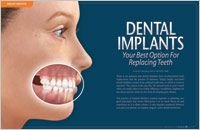
Dental Implants – Your Best Option For Replacing Teeth Dental implants have many advantages over older methods of tooth replacement like bridges and dentures — from the way they function and feel to the way they look and last. Vigorous research has documented and confirmed that in the right situations, dental implant success rates are over 95%. It is no exaggeration to say that they have revolutionized dentistry. They may even change your life... Read Article
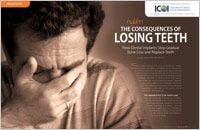
The Hidden Consequences of Losing Teeth For those missing even one tooth, an unsightly gap is actually the least significant problem. What's of far greater concern is the bone loss that inevitably follows tooth loss. Dental implants can preserve bone, improve function and enhance psychological well-being. Learn how implants serve both as anchors to support replacement teeth and preserve bone... Read Article
-
Top Reasons to Choose Dental Implants
Category: Implant Dentistry
-
Hidden Consequences of Losing Teeth
Category: Implant Dentistry
If you have lost any of your teeth, you no doubt realize there are consequences to living without them: Your smile may not look the way you want it to; eating, speaking and intimacy may be more difficult; and your self-confidence may fade. Though serious, these are not the only impacts. There are hidden
Read more -
Dental Implants FAQs
Category: Implant Dentistry
What are dental implants? Dental implants are small titanium posts that replace the roots of missing teeth (View Example). They are inserted into your jawbone during a minor surgical procedure that takes place in the dental office. After the implant has been placed in your jawbone, a completely lifelike
Read more -
Bone Grafting
Category: Implant Dentistry
Replacement teeth supported by dental implants function so well and last so long because, like natural teeth, they are securely anchored in the jawbone for maximum support. In order to benefit from this remarkable technology, however, you need to have enough tooth-supporting bone in your jaw to hold
Read more -
Fixed Dentures
Category: Implant Dentistry
If you have lost an entire arch of teeth (top and/or bottom), or are soon to have your remaining teeth removed because they are too unhealthy to save, you may be able to replace them with fixed dentures supported by dental implants. Doctors and patients alike prefer fixed over removable dentures because
Read more
Contact Us
Send Us an Email
Our Location
Find us on the map
Hours of Operation
Our Regular Schedule
Bernard Genet DDS
Monday:
9:00 am-5:30 pm
Tuesday:
11:30 am-7:00 pm
Wednesday:
Closed
Thursday:
9:30 am-4:00 pm
Friday:
9:00 am-4:00 pm
Saturday:
Closed
Sunday:
Closed
